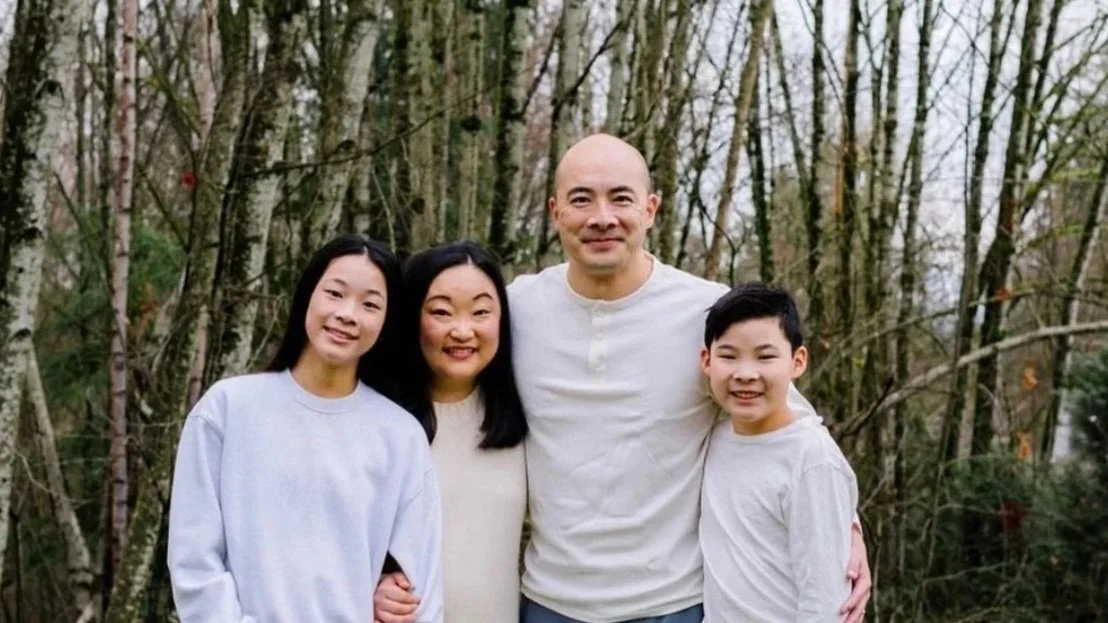
FEATURE
A Life Full of Love:
Remembering Nina Pak Lui
Sadie McDonald
April 18, 1980 - May 14, 2025
“She was a great mom,” said Jason Lui, husband of Nina Pak Lui. “The kids and I loved how gullible she was at times. She had a passion for learning, sports and travelling. The cool thing is that the kids wanted to continue travelling, and as Nina was sick, she just encouraged that too. She said, ‘You know what, go to places that we should have visited together.’”
Jason and Nina met at Pacific Academy in 2001 when he was hired to be a PE teacher and she was starting her new position as the assistant counsellor to the high school. A maternity leave resulting in Jason transferring to the middle school meant that he and Nina did not see each other until the following year at an outreach retreat.
“By then, some of our mutual friends were saying, ‘Hey, don’t you know Nina?’ or, they were asking Nina, ‘Hey, don’t you know Jason?’” he recalled. “Finally, I had the courage to be like, ‘Okay, like a lot of people have been talking about us, you know. Do you want to grab some hot chocolate and a cookie, and we could talk?’” That talk began a five-to-six-year relationship before they got married and later had Yuna, now 14, and Jonah, now 12.
Nina’s passion for curriculum design and assessment informed her work as she taught and mentored new and upcoming teachers at TWU. She began in 2015 as a part-time instructor in the School of Education and became an assistant professor in 2019. Nina was recognized in 2020 for her professional excellence, scholarly experimentation and innovation when she was awarded the TWU Provost Innovative Teaching Award.
In 2022, Nina became a PhD student at the University of British Columbia to get her doctorate in Community Engagement, Social Change, Equity under the supervision of Dr. Leyton Schnellert, associate professor in UBC’s Department of Curriculum & Pedagogy and co-director of the Canadian Institute for Inclusion and Citizenship.
“Her goal for the PhD was to decolonize self and reflectively and reflexively transform practises in teacher education,” explained Jason, noting that Nina took what she studied at UBC and put it into practice at TWU.
“She really had to look back to how she grew up as an individual,” said Jason on Nina’s decolonization of the self. “She definitely just started that journey, so part of that was to connect with the First Nations people in B.C. and see how the university education programs in B.C. can help First Nations teachers become better teachers too.”
There is room for improvement in all post-secondary programs, and like all teachers, Nina reflected on her own practises. In focusing on the reflexive transformation of teaching practises, Nina viewed improvement as something that should be an automatic reflex, not an obligation.
“She was not only a colleague but a friend who shared deeply in the joys and hardships of life,” said Patti Victor Switametelót, Trinity Western University Siya:m. Patti’s work with Nina began in the School of Education when Nina would invite her to speak in her classes so that Nina could learn about Indigenous ways of knowing and being alongside her students. As Nina entered her doctoral studies, Patti became her coach and mentor, something she described as a “privilege.”
“Her pedagogy of reciprocal and collaborative relationships was modelled in her active participation in the Day of Learning, in supporting Indigenous teachers in their journey, and leaning into the importance of identity, not only her own but including students,” said Patti.
Nina’s embracement of Indigenous ways of knowing and being are present in the memories of Nina most significant to Patti, such as when Nina and her family came to the Naming Ceremony at Xchíyò:m.
But Nina’s work with the communities around her did not stop there. Jason is currently an ELL teacher at a school with lower literacy rates.
So, Nina had some of her third and fourth-year education students come in and do a field experience as a way of serving the community and help increase the students’ reading rates. The work Nina began with the school’s administration team continues today, now under the co-leadership of the school’s current principal, the reading recovery teacher and Lisa Olding, a sessional assistant professor of education at TWU.
So when Nina began struggling to recall words and having difficulty reading, she knew something was wrong. “We still remember the day that it all happened,” said Jason. “It was September 29, 2023, and the emergency doctor came in and said, ‘Hey, you’re not going anywhere because we found a mass. It’s right above your left ear, where the temple is, so you can’t go home and we’re gonna do a surgery pretty much right away to get it out.’”
It was a world-flipping moment in which the Lui family’s future suddenly became unknown. Jason and Nina did not tell their kids right away, needing to gather their thoughts. “We wanted to let them know that we were going to fight this—whatever this unknown mass was—together, that we were gonna fight with mom alongside mom,” said Jason. “That was our primary mission as a family, to continue to fight against this disease, whatever it was.”
What the disease was took longer to learn, as the brain surgery that removed 30 to 40 percent of the tumour took place on October 6, 2023, and the diagnosis of glioblastoma was made a month later.
According to Sunnybrook Health Sciences Centre, two to three per 100,000 people in Canada get glioblastomas, the most common and aggressive cancerous tumour originating in the brain. Glioblastomas are more common in men and individuals above the age of 45. There is no cure.
When Nina was diagnosed at 43, her five-year survival rate was less than five percent, and with treatment, her prognosis was one to two years. The second time the emergency room doctor came to speak to Jason and Nina, she gave them some advice: ask for help.
“She’s seen families be in two different camps. The first camp is the families who would hold this information in private because they want to walk by themselves through this journey. The second camp would be the opposite, where they would share it with people who are close to them and ask for help,” recounted Jason.
Those in the first camp became more bitter and resentful, while those in the second camp were healthier in the long run. Nina did not have to think twice. “I remember Nina automatically said, ‘I want to get help,’” said Jason, whose response was the same.
The amount of help that the Luis received over Nina’s 20-month journey with cancer was abundant, making the three brain surgeries, 30 rounds of radiation and four chemotherapy treatments easier to handle as the community pitched in to make a GoFundMe page, meal train and Facebook group and to provide gardening lessons, insurance paperwork advice and company during medical appointments and hospital admissions.
Nina’s biggest supporters included ‘The Fantastic Four’—Julie Frizzo-Barker, Christine Song, Megan Kuo and Suzanne Sheena-Nakai —who each took on responsibility to help ease some of the burdens faced by the Luis.
Less than five weeks after Nina’s first brain surgery, an MRI revealed that the portion of the tumour that had been removed had already grown back. Many forms of grief accompany a cancer diagnosis, and part of this involved Nina grieving her old self. “I remember she kept saying how, out of all the places to get cancer for me, it is the brain because she was a PhD student and a professor,” said Jason. “For her, in losing her brain like that, it was just very frustrating.”
Nina’s cancer was in the temporal lobe, the language centre of the brain. However, this also resulted in the inability to filter emotions, causing Nina to react to triggers by becoming anxious or angry. The family’s counsellor helped them process this. “Sometimes you see Nina there, but because it’s brain cancer; it’s almost like you’re sometimes talking to another person,” said Jason. “We named that person ‘Glio’ after glioblastoma, so to us it would be the situation against Glio, not against mom.”
Despite the challenges of cancer, the side effects of chemotherapy and the consequences of major neurosurgery, Nina continued to learn. When she could no longer read, she listened to audiobooks, specifically ones on how to navigate challenging seasons. In this, both Nina and Jason discovered there’s no guide for how to grieve.
Nina’s faith was evident to those around her, and even though she asked God why this was happening to her, she continued to praise Him. “I remember at the hospice in the last few weeks, she would be asking me, ‘How much longer before I see Him?’” said Jason. “I think she knew, and by that time, the doctors and the oncologists were already letting us know that they tried everything.”
It was faith that helped Jason, too. “I know I wouldn’t have made it without Him. He showed up every day, and His goodness ran after me every day. I just had to intentionally see it,” he said. “There’s hope. There’s trust in Him that this is not the end of Nina. She lives on in each one of us who has been touched by her. How can I move forward representing Nina and representing Him, and how can I help my kids do that?”
For Jason, living like Nina would look like being passionate about lifelong learning, knowing that it is okay to make mistakes, being responsible for your actions and setting healthy boundaries. “Nina would want people to learn how to ask for help. We definitely learned that as a family through this journey,” said Jason. “We realized that people are willing to help, but they just don’t know how to. Nina lived her life learning to be a better person, so that she in turn could serve others better.”
Nina’s celebration of life on June 8, 2025, was attended by more than 500 people, a tribute to the many people whose lives she touched. And yet, her story is not over. True to her fashion as a lifelong learner and educator, Nina desired to use her experience to help others.
“Right after the first brain surgery, when she was just sitting at Royal Columbian Hospital and Julie was visiting, she said, ‘Hey, Julie, can you write a book? You and Jason should write a book about me and this journey,’” said Jason. “We were trying to find resources to see how other families have gone through glioblastoma, and there weren’t any current or relevant ones. The heart of Nina is wanting to help others.”
So Jason began to write, and two of his close friends agreed to be the illustrators. “I think it’ll just be an incredible tribute to Nina. Our goal is to help other people through this and to remind them that they’re not alone,” said Jason. “Even though there’s suffering and grief, life is still full of silver linings, or, in our case, as believers, His goodness.”

